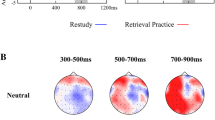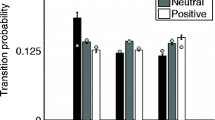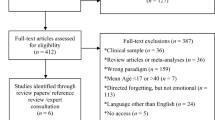Abstract
Emotion regulates our memory in daily life. Previous studies have shown that extrinsic emotion during encoding impairs the memory for target stimulus. However, most previous studies focused on the effects of emotion on the typical encoding without intentional retrieval. It remains unclear how emotion affects the retrieval-based encoding and memory. In the present study, we examined how encoding type (restudy versus retrieval practice) regulates emotional memory retention. We adopted a typical retrieval practice paradigm with an initial study phase, a second phase with either a restudy or a retrieval practice task, and a final recognition test. In order to create extrinsic emotional background, emotional pictures were used during the restudy and retrieval practice tasks. The recognition test was carried out 5 min or 24 h after the restudy or retrieval practice task. We found an emotional impairment effect on familiarity (5-min retention interval) under the retrieval practice condition, but not under the restudy condition, and an emotional enhancement effect on item memory (24-h retention interval) under the restudy condition, but not under the retrieval practice condition. The present study demonstrated the effect of encoding type on emotional memory and suggested a retention interval dependent effect of encoding type, contributing to the theory of emotional memory by highlighting the role of encoding type and retention interval.


Similar content being viewed by others
Data Availability
Data from the current study are available from the corresponding author on reasonable request.
References
Anderson, A. K., Wais, P. E., & Gabrieli, J. D. (2006). Emotion enhances remembrance of neutral events past. Proceedings of the National Academy of Sciences of the United States of America, 103(5), 1599–1604. https://doi.org/10.1073/pnas.0506308103
Baddeley, A., Lewis, V., Eldridge, M., & Thomson, N. (1984). Attention and retrieval from long-term memory. Journal of Experimental Psychology: General, 113(4), 518–540. https://doi.org/10.1037/0096-3445.113.4.518
Bastin, C., Besson, G., Simon, J., Delhaye, E., & Salmon, E. (2019). An integrative memory model of recollection and familiarity to understand memory deficits. Behavioral and Brain Sciences, 42, 1–66. https://doi.org/10.1017/S0140525X19000621
Cox, R., Van Bronkhorst, M. L., Bayda, M., Gomillion, H., Cho, E., Parr, M. E., & Stickgold, R. (2018). Sleep selectively stabilizes contextual aspects of negative memories. Scientific Reports, 8(1), 1–13. https://doi.org/10.1038/s41598-018-35999-9
Craik, F. I. M., Govoni, R., Naveh-Benjamin, M., & Anderson, N. D. (1996). The effects of divided attention on encoding and retrieval processes in human memory. Journal of Experimental Psychology: General, 125(2), 159–180. https://doi.org/10.1037/0096-3445.125.2.159
Denis, D., Sanders, K. E., Kensinger, E. A., & Payne, J. D. (2022). Sleep preferentially consolidates negative aspects of human memory: Well-powered evidence from two large online experiments. Proceedings of the National Academy of Sciences, 119(44), e2202657119. https://doi.org/10.1073/pnas.2202657119
Easterbrook, J. A. (1959). The effect of emotion on cue utilization and the organization of behavior. Psychological Review, 66(3), 183–201. https://doi.org/10.1037/h0047707
Finn, B., & Roediger, I. I. I., H. L (2011). Enhancing retention through reconsolidation: Negative emotional arousal following retrieval enhances later recall. Psychological Science, 22(6), 781–786. https://doi.org/10.1177/0956797611407932
Halamish, V., & Bjork, R. A. (2011). When does testing enhance retention? A distribution-based interpretation of retrieval as a memory modifier. Journal of Experimental Psychology: Learning Memory and Cognition, 37(4), 801–812. https://doi.org/10.1037/a0023219
Han, M., Mao, X., Kartvelishvili, N., Li, W., & Guo, C. (2018). Unitization mitigates interference by intrinsic negative emotion in familiarity and recollection of associative memory: Electrophysiological evidence. Cognitive Affective & Behavioral Neuroscience, 18(6), 1259–1268. https://doi.org/10.3758/s13415-018-0636-y
Hicks, J. L., & Marsh, R. L. (2000). Toward specifying the attentional demands of recognition memory. Journal of Experimental Psychology: Learning, Memory, and Cognition, 26(6), 1483–1498. https://doi.org/10.1037/0278-7393.26.6.1483
Jaeger, A., Johnson, J. D., Corona, M., & Rugg, M. D. (2009). ERP correlates of incidental retrieval of emotional information: Effects of study-test delay. Brain Research, 1269, 105–113. https://doi.org/10.1016/j.brainres.2009.02.082
Jia, X., Gao, C., Cui, L., & Guo, C. (2018). Does emotion arousal influence the benefit received from testing: Insights from neural correlates of retrieval mode effect. Neuroreport, 29, 1449–1455. https://doi.org/10.1097/WNR.0000000000001130
Jia, X., Gao, C., Wang, Y., Han, M., Cui, L., & Guo, C. (2019). Emotional arousal influences remembrance of goal-relevant stimuli. Emotion, 20(8), 1357–1368. https://doi.org/10.1037/emo0000657
Karpicke, J. D., & Zaromb, F. M. (2010). Retrieval mode distinguishes the testing effect from the generation effect. Journal of Memory & Language, 62(3), 227–239. https://doi.org/10.1016/j.jml.2009.11.010
Kensinger, E. A., & Corkin, S. (2004). Two routes to emotional memory: Distinct neural processes for valence and arousal. Proceedings of the National Academy of Sciences of the United States of America, 101(9), 3310–3315. https://doi.org/10.1073/pnas.0306408101
Kensinger, E. A., & Ford, J. H. (2020). Retrieval of emotional events from memory. Annual Review of Psychology, 71, 251–272. https://doi.org/10.1146/annurev-psych-010419-051123
Knight, M., & Mather, M. (2009). Reconciling findings of emotion-induced memory enhancement and impairment of preceding items. Emotion, 9(6), 763–781. https://doi.org/10.1037/a0017281
Koen, J. D., & Yonelinas, A. P. (2016). Recollection, not familiarity, decreases in healthy ageing: Converging evidence from four estimation methods. Memory, 24(1), 75–88. https://doi.org/10.1080/09658211.2014.985590
Kroes, M. C., Tendolkar, I., Van Wingen, G. A., Van Waarde, J. A., Strange, B. A., & Fernández, G. (2014). An electroconvulsive therapy procedure impairs reconsolidation of episodic memories in humans. Nature Neuroscience, 17(2), 204–206. https://doi.org/10.1038/nn.3609
LaBar, K. S., & Phelps, E. A. (1998). Arousal-mediated memory consolidation: Role of the medial temporal lobe in humans. Psychological Science, 9(6), 490–493. https://doi.org/10.1111/1467-9280.00090
Lang, P. J., Bradley, M. M., & Cuthbert, B. N. (2008). International Affective Picture System (IAPS): Affective ratings of pictures and instruction manual. Gainesville, FL: University of Florida. Technical Report A-6.
Lee, T. H., Greening, S. G., & Mather, M. (2015). Encoding of goal-relevant stimuli is strengthened by emotional arousal in memory. Frontiers in Psychology, 6, 1173–1180. https://doi.org/10.3389/fpsyg.2015.01173
Liu, Y., Rosburg, T., Gao, C., Weber, C., & Guo, C. (2017). Differentiation of subsequent memory effects between retrieval practice and elaborative study. Biological Psychology, 127, 134–147.
Lozito, J. P., & Mulligan, N. W. (2006). Exploring the role of attention during memory retrieval: Effects of semantic encoding and divided attention. Memory & Cognition, 34(5), 986–998. https://doi.org/10.3758/BF03193246
Lu, B., Hui, M. A., & Yu-Xia, H. (2005). The development of native Chinese affective picture System–A pretest in 46 college students. Chinese Mental Health Journal, 19(11), 719–722. https://doi.org/10.1016/j.molcatb.2005.02.001
Mackay, D. G., Shafto, M., Taylor, J. K., Marian, D. E., Abrams, L., & Dyer, J. R. (2004). Relations between emotion, memory, and attention: Evidence from taboo Stroop, lexical decision, and immediate memory tasks. Memory & Cognition, 32(3), 474–488. https://doi.org/10.3758/BF03195840
Mather, M., & Sutherland, M. R. (2011). Arousal-biased competition in perception and memory. Perspectives on Psychological Science A Journal of the Association for Psychological Science, 6, 114–133. https://doi.org/10.1177/1745691611400234
Mathewson, K. J., Arnell, K. M., & Mansfield, C. A. (2008). Capturing and holding attention: The impact of emotional words in rapid serial visual presentation. Memory & Cognition, 36(1), 182–200. https://doi.org/10.3758/MC.36.1.182
Mccullough, A. M., Ritchey, M., Ranganath, C., & Yonelinas, A. (2015). Differential effects of stress-induced cortisol responses on recollection and familiarity-based recognition memory. Neurobiology of Learning & Memory, 123, 1–10. https://doi.org/10.1016/j.nlm.2015.04.007
Mcgaugh, J. L. (2004). The amygdala modulates the consolidation of memories of emotionally arousing experiences. Annual Review of Neuroscience, 27(27), 1–28. https://doi.org/10.1146/annurev.neuro.27.070203.144157
Mulligan, N. W., & Picklesimer, M. (2016). Attention and the testing effect. Journal of Experimental Psychology: Learning, Memory, and Cognition, 42(6), 938–950. https://doi.org/10.1037/xlm0000227
Ochsner, K. N. (2000). Are affective events richly recollected or simply familiar? The experience and process of recognizing feelings past. Journal of Experimental Psychology: General, 129(2), 242–261. https://doi.org/10.1037//0096-3445.129.2.242
Pan, S. C., & Rickard, T. C. (2018). Transfer of test-enhanced learning: Meta-analytic review and synthesis. Psychological Bulletin, 144(7), 710–756. https://doi.org/10.1037/bul0000151
Phelps, E. A., & Sharot, T. (2008). How (and why) emotion enhances the subjective sense of recollection. Current Directions in Psychological Science, 17(2), 147–152. https://doi.org/10.1111/j.1467-8721.2008.00565.x
Pierce, B. H., & Kensinger, E. A. (2011). Effects of emotion on associative recognition: Valence and retention interval matter. Emotion, 11(1), 139–144. https://doi.org/10.1037/a0021287
Roediger, H. L., & Karpicke, J. D. (2006). The power of testing memory: Basic research and implications for educational practice. Perspectives on Psychological Science, 1(3), 181–210. https://doi.org/10.1111/j.1745-6916.2006.00012.x
Rugg, M. D., & Curran, T. (2007). Event-related potentials and recognition memory. Trends in Cognitive Sciences, 11(6), 251–257. https://doi.org/10.1016/j.tics.2007.04.004
Sakaki, M., Fryer, K., & Mather, M. (2014). Emotion strengthens high-priority memory traces but weakens low-priority memory traces. Psychological Science, 25(2), 387–395. https://doi.org/10.1177/0956797613504784
Schaefer, A., & Philippot, P. (2005). Selective effects of emotion on the phenomenal characteristics of autobiographical memories. Memory,13(2), 148–160. https://doi.org/10.1080/09658210344000648
Schaefer, A., Pottage, C. L., & Rickart, A. J. (2011). Electrophysiological correlates of remembering emotional pictures. Neuroimage, 54(1), 714–724. https://doi.org/10.1016/j.neuroimage.2010.07.030
Schümann, D., Bayer, J., Talmi, D., & Sommer, T. (2017). Dissociation of immediate and delayed effects of emotional arousal on episodic memory. Neurobiology of Learning and Memory, 148, 11–19. https://doi.org/10.1016/j.nlm.2017.12.007
Schmidt, S. R., & Schmidt, C. R. (2016). The emotional carryover effect in memory for words. Memory, 24(7), 916–938. https://doi.org/10.1080/09658211.2015.1059859
Sharot, T., Delgado, M. R., & Phelps, E. A. (2004). How emotion enhances the feeling of remembering. Nature Neuroscience, 7(12), 1376–1380. https://doi.org/10.1038/nn1353
Smith, A. P. R., Stephan, K. E., Rugg, M. D., & Dolan, R. J. (2006). Task and content modulate amygdala-hippocampal connectivity in emotional retrieval. Neuron, 49(4), 631–638. https://doi.org/10.1016/j.neuron.2005.12.025
Ventura-Bort, C., Löw, A., Wendt, J., Moltó, J., Poy, R., Dolcos, F., Hamm, A., & Weymar, M. (2016). Binding neutral information to emotional contexts: Brain dynamics of recognition after a long retention interval. Cognitive Affective & Behavioral Neuroscience, 16, 234–247. https://doi.org/10.3758/s13415-015-0385-0
Ventura-Bort, C., Wendt, J., Wirkner, J., König, J., Lotze, M., Hamm, A. O., & Weymar, M. (2020). Neural substrates of long-term item and source memory for emotional associates: An fMRI study. Neuropsychologia, 147, 107561. https://doi.org/10.1016/j.neuropsychologia.2020.107561
Yonelinas, A. P. (2002). The nature of recollection and familiarity: A review of 30 years of research. Journal of Memory and Language, 46(3), 441–517. https://doi.org/10.1006/jmla.2002.2864
Yonelinas, A. P., & Jacoby, L. L. (1995). The relation between remembering and knowing as bases for recognition: Effects of size congruency. Journal of Memory and Language, 34, 622–643. https://doi.org/10.1006/jmla.1995.1028
Yonelinas, A. P., & Ritchey, M. (2015). The slow forgetting of emotional episodic memories: An emotional binding account. Trends in Cognitive Sciences, 19(5), 259–267. https://doi.org/10.1016/j.tics.2015.02.009
Zhang, Q., Liu, X., An, W., Yang, Y., & Wang, Y. (2015). Recognition memory of neutral words can be impaired by task-irrelevant emotional encoding contexts: Behavioral and electrophysiological evidence. Frontiers in Human Neuroscience, 9, 73. https://doi.org/10.3389/fnhum.2015.00073
Author information
Authors and Affiliations
Corresponding author
Ethics declarations
Conflict of Interest
There are no potential or actual conflicts of interest.
Compliance with Ethical Standards
This study was approved by the Hangzhou Normal University Institutional Review Board and performed in accordance with the ethical standards as laid down in the 1964 Declaration of Helsinki.
Additional information
Publisher’s Note
Springer Nature remains neutral with regard to jurisdictional claims in published maps and institutional affiliations.
The present study was supported by National Natural Science Foundation of China 32200848 (X.J.) and Hangzhou Normal University Scientific Research start-up fund project RWSK20201013 (X.J.)
Electronic supplementary material
Below is the link to the electronic supplementary material.
Rights and permissions
Springer Nature or its licensor (e.g. a society or other partner) holds exclusive rights to this article under a publishing agreement with the author(s) or other rightsholder(s); author self-archiving of the accepted manuscript version of this article is solely governed by the terms of such publishing agreement and applicable law.
About this article
Cite this article
Jia, X., Gao, C., Wu, D. et al. Effects of encoding type and retention interval on emotional memory. Curr Psychol 43, 2114–2123 (2024). https://doi.org/10.1007/s12144-023-04396-5
Accepted:
Published:
Issue Date:
DOI: https://doi.org/10.1007/s12144-023-04396-5




